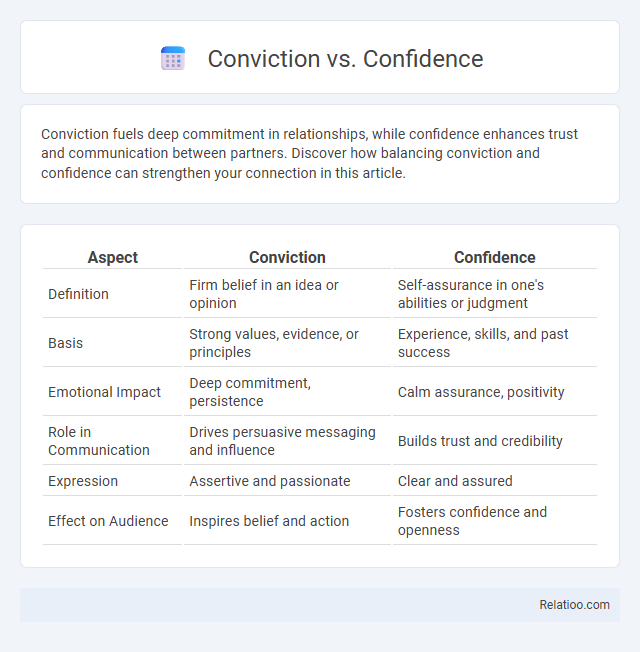Conviction fuels deep commitment in relationships, while confidence enhances trust and communication between partners. Discover how balancing conviction and confidence can strengthen your connection in this article.
Table of Comparison
| Aspect | Conviction | Confidence |
|---|---|---|
| Definition | Firm belief in an idea or opinion | Self-assurance in one's abilities or judgment |
| Basis | Strong values, evidence, or principles | Experience, skills, and past success |
| Emotional Impact | Deep commitment, persistence | Calm assurance, positivity |
| Role in Communication | Drives persuasive messaging and influence | Builds trust and credibility |
| Expression | Assertive and passionate | Clear and assured |
| Effect on Audience | Inspires belief and action | Fosters confidence and openness |
Understanding Conviction and Confidence
Conviction reflects your firm belief in the truth or validity of an idea, deeply rooted in personal values and evidence, while confidence represents your self-assuredness in executing tasks or making decisions. Understanding conviction is crucial for developing resilience and clarity in your goals, as it drives commitment beyond mere self-belief. Confidence can fluctuate with circumstances, but conviction provides a stable foundation that guides consistent actions and reinforces your sense of purpose.
Defining Conviction: Core Principles
Conviction represents your deeply held beliefs that guide decision-making and behavior with unwavering certainty. Core principles of conviction include clarity of purpose, resilience under pressure, and alignment with personal values, ensuring actions are consistent and purposeful. Understanding conviction helps differentiate it from confidence, which is belief in one's abilities, and certainty, which is the subjective sense of assurance.
What is Confidence? Meaning and Impact
Confidence is the belief in one's abilities, skills, and judgment, enabling decisive action and resilience in the face of challenges. It influences performance in various domains, including professional settings, personal relationships, and decision-making processes by fostering a positive mindset and reducing anxiety. High confidence levels correlate with increased motivation, better communication, and improved problem-solving capabilities, crucial for success and personal growth.
Key Differences Between Conviction and Confidence
Conviction is a firm belief in the truth or certainty of something, often rooted in values or principles, while confidence refers to a feeling of self-assurance stemming from one's abilities or experience. Your conviction remains steadfast despite external doubts or challenges, whereas confidence can fluctuate based on past successes or failures. Understanding the key differences between conviction and confidence helps you make decisions grounded both in core beliefs and your skills.
The Role of Belief in Conviction
Belief serves as the cornerstone of conviction, anchoring it deeply within an individual's values and principles, unlike confidence, which is often based on self-assurance or experience. Conviction drives decisive actions and steadfast commitment, fueled by a profound trust in the validity of one's beliefs. It distinguishes itself by the intensity and persistence of belief, which propels unwavering dedication despite external challenges or doubts.
Self-Assurance: The Foundation of Confidence
Self-assurance forms the core of confidence, reflecting a deep trust in one's abilities and judgments. Conviction differs by representing a firmly held belief or principle driving decisions and actions. This foundational self-assurance enables individuals to act decisively while maintaining resilience in challenging situations.
How Conviction Shapes Decision-Making
Conviction profoundly influences decision-making by providing a strong sense of certainty and commitment to your choices, enabling you to remain steadfast despite challenges or doubts. Unlike confidence, which reflects your belief in your abilities, conviction is rooted in deeply held values and principles that guide your actions decisively. Your decisions, driven by conviction, tend to be more resilient and purpose-driven, shaping outcomes with clarity and determination.
Building True Confidence: Steps and Strategies
Building true confidence involves distinguishing it from mere conviction by grounding your beliefs in experience and evidence rather than assumptions. You can develop genuine confidence through consistent practice, learning from failures, and embracing growth opportunities that reinforce your skills and self-awareness. Applying these strategies enables your conviction to be informed and resilient, transforming confidence into a powerful foundation for personal and professional success.
Balancing Conviction and Confidence in Leadership
Balancing conviction and confidence in leadership is essential for effective decision-making and inspiring trust within teams. Conviction drives leaders to remain steadfast in their values and vision, while confidence enables them to communicate decisions assertively and adapt to challenges. Maintaining equilibrium between these qualities fosters resilience, credibility, and the ability to navigate complex organizational environments successfully.
Cultivating Both for Personal and Professional Growth
Cultivating both conviction and confidence is essential for personal and professional growth, as conviction drives commitment to core values and goals while confidence empowers decisive action and resilience in challenges. Developing a strong conviction provides clarity and purpose, anchoring decisions in deeply held beliefs, whereas building confidence enhances self-efficacy, enabling individuals to tackle uncertainty with assurance. Balancing conviction with confidence fosters strategic risk-taking, effective leadership, and sustained motivation, crucial for long-term success and fulfillment.

Infographic: Conviction vs Confidence
 relatioo.com
relatioo.com